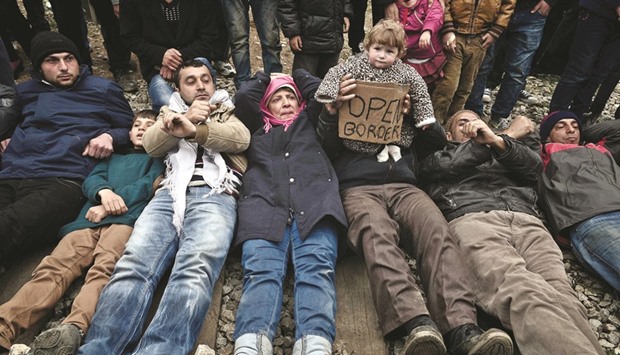Stranded migrants lay with their children on rail tracks at Greece’s northern border yesterday, demanding to be allowed to continue their journey, as Athens warned the number of people “trapped” on its soil could more than triple next month.
Tensions between European countries worst affected by the migrant crisis were still running high, with Austria’s Chancellor Werner Faymann accusing Greece of “behaving like a travel agency”.
“We estimate that in our country the number of those trapped will be from 50,000-70,000 people next month,” Greek Migration Minister Yiannis Mouzalas said, after countries along the Balkan route introduced limits on migrant crossings.
“Today, there are 22,000 refugees and migrants,” Mouzalas added in an interview with Mega TV.
On Greece’s border with Macedonia, several hundred refugees and migrants protested by sitting and lying with their children on the rail tracks, an AFP journalist said, as 6,500 people remained trapped at the Idomeni camp near the frontier.
Some lay on the tracks with their children, while others held up handwritten posters that read “Open the borders, no food” and “We are humans, not animals”.
They later moved towards the border fence, chanting slogans to demand to be allowed into Macedonia, the next country along the Balkan migrant route, a day after Macedonian border officials let only 300 migrants through.
“I’m 17 days on the road with my family and my two children. I don’t know what to do,” one Syrian man lying on the rail tracks with his children told Athens News Agency.
The build-up at the camp at Idomeni, which can hold up to 1,500 people, began in earnest last week after Macedonia began refusing entry to Afghans and imposed stricter controls on Syrians and Iraqis.
The bottleneck was expected to worsen after EU members Slovenia and Croatia, as well as Serbia and Macedonia, imposed a daily limit of 580 migrants.
Those measures came on the heels of a clampdown by Austria, which lies farther up the trail to Germany and Scandinavia.
Austria introduced a daily cap of 80 asylum-seekers and said it would allow just 3,200 migrants to transit the country per day.
The controls have had a knock-on effect in Greece, where migrants have been arriving en masse from neighbouring Turkey.
Thousands, including many children, are now stranded there as the European Union struggles with the continent’s worst migration crisis since World War II.
The tension has resulted in a public spat, with Austria accusing Greece of failing to adequately police its borders under its duty as the southeastern flank of Europe’s Schengen passport-free zone.
Chancellor Faymann accused Greece of “behaving like a travel agency”, and added in remarks to Austrian media: “Last year, Greece took in 11,000 asylum-seekers, we took in 90,000. That can’t be allowed to happen again.”
But Mouzalas said Austria’s politicians were talking with one eye on the electoral calendar: a presidential poll is due in April.
“Austria is a friendly country. They have reacted this way because of course they have accepted many migrants but also because elections are on the way,” he told Mega TV.
Mouzalas said he expected the influx to slow when the information about closed borders spread in Turkey, where more than 2mn people fleeing the war in Syria have taken refuge.
He also said the campaign alongside Nato’s presence in the Aegean Sea, which is helping to police Greek waters, was expected to reduce arrivals by 70%.
Pope Francis used his weekly address yesterday to hail the “generous help” offered by Greece to migrants and to urge European countries to work together to “share the burden fairly”.
In Italy, authorities are making preparations in case the border closures redirect the migrant flow towards the southeastern province of Puglia, which lies across the Adriatic Sea from Albania.
Coastguards and customs officials are patrolling the 300km (180-mile) coastline, which has numerous secluded beaches where migrant boats can land discreetly.
Meanwhile, German Interior Minister Thomas de Maiziere said he wants to speed up repatriations of rejected asylum-seekers from North Africa.
Modern technology such as biometric identity papers could help, he said, adding that “we could imagine offering our support” in the area.
“Our goal is to make the procedures more efficient and faster,” he said in e-mailed responses to written questions from AFP.
De Maiziere was to begin yesterdau a visit to Morocco, Algeria and Tunisia – nations that would be declared safe countries of origin under a law that Germany wants to introduce, thus making it easier to send back rejected asylum applicants.

Migrants trapped at the Greek-Macedonian borders lie on the rail tracks leading to Macedonia during their protest demanding the opening of the borders.
